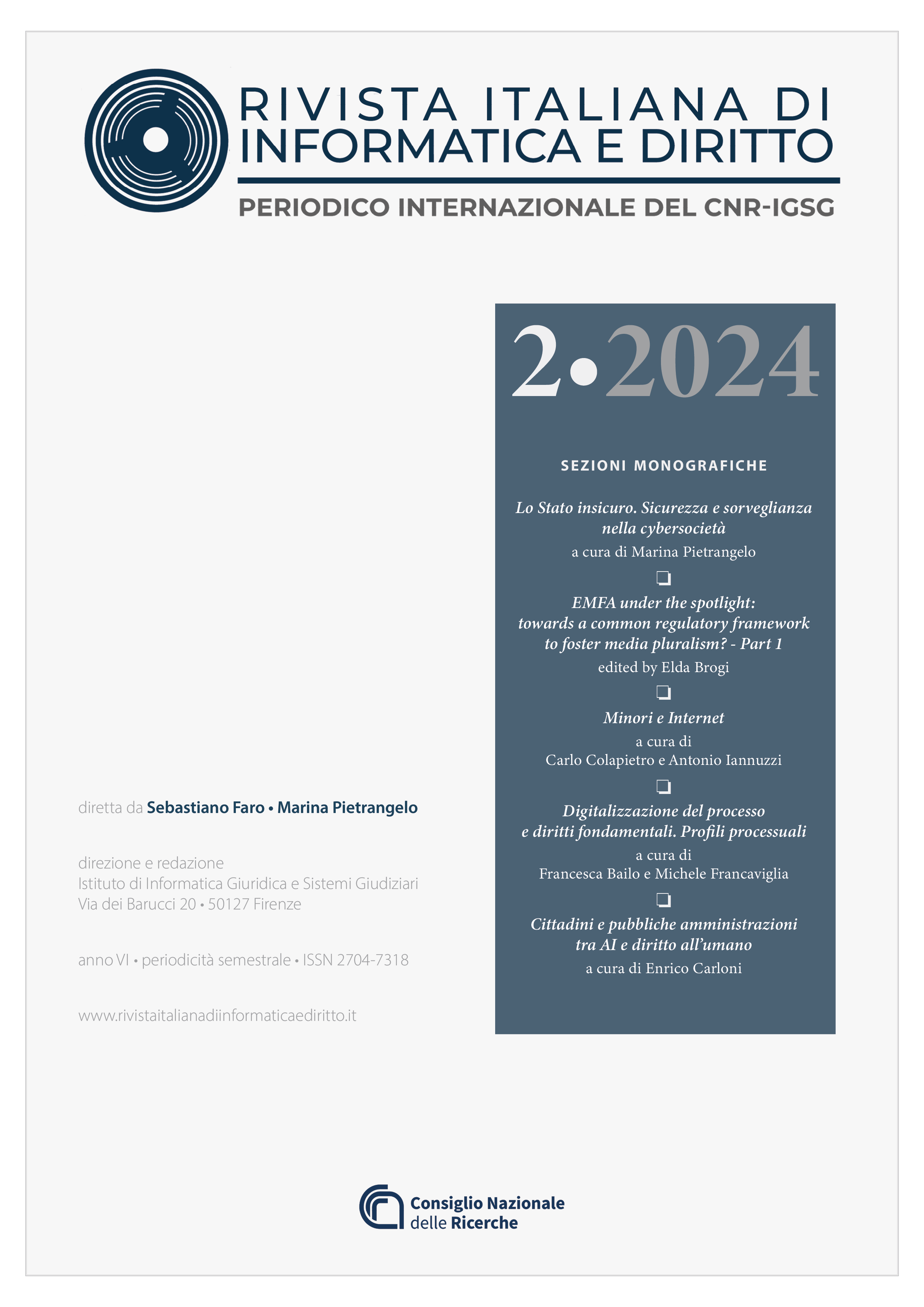Il pezzo mancante nel mosaico del DSA? L'articolo 18 dell'EMFA e il privilegio dei media
DOI:
https://doi.org/10.32091/RIID0173Parole chiave:
Privilegio mediale, EMFA, Libertà d’espressione, Libertà d’informazione, DSA, Moderazione dei contenutiAbstract
L’articolo esamina le disposizioni degli articoli 18 e 19 dell'European Media Freedom Act (EMFA) in relazione al quadro della governance digitale definito dal Digital Services Act (DSA), con particolare attenzione al privilegio mediale codificato nell'articolo 18 EMFA. La sezione 2 analizza il privilegio dei media di cui agli articoli 18 e 19 EMFA da tre punti di vista: i requisiti per ottenere questo privilegio e i soggetti mediali che possono beneficiarne; il funzionamento del suddetto privilegio e le sue intersezioni con il DSA; i meccanismi di trasparenza e il ruolo del Comitato ex articolo 19 EMFA. La sezione 3 esplora il quadro costituzionale che sottende il privilegio per i media di cui all'articolo 18 EMFA e affronta le critiche a questo privilegio mediale. In particolare, la sezione si sofferma su due critiche: il rischio di accordare questo privilegio ad agenti attivi nelle campagne di disinformazione e la legittimità “costituzionale” di tale privilegio. Le osservazioni finali riassumono le principali riflessioni e offrono alcune osservazioni conclusive.
Riferimenti bibliografici
S.A. Allioui (2024), EU Media Freedom Act: the convolutions of the new legislation, EU Law Analysis, 6 June 2024
J. Barata (2022), Protecting Media Content on Social Media Platforms, in “Verfassungsblog: On Matters Constitutional”, 25 November 2022
J. Bayer, K. Cseres (2023),Without Enforcement, the EMFA Is Dead Letter, in “Verfassungsblog: On Matters Constitutional”, 13 June 2023
L. Bertuzzi (2021), Media exemption ruled out in DSA negotiations, but could return, Euractiv, 2021
M. Cappello (ed.) (2017), Journalism and Media Privilege, IRIS Special, European Audiovisual Observatory, 2017
P. Cesarini, G. De Gregorio, O. Pollicino (2023), The Media Privilege in the European Media Freedom Act’, in “MediaLaws”, 2023
P. Collings, C. Schmon (2023), EU Media Freedom Act: A Media Privilege in Content Moderation Is a Really Bad Idea, Electronic Frontier Foundation, 12 July 2023
Council of Europe (2021), Guidance Note on the Prioritisation of Public Interest Content Online adopted by the Steering Committee for Media and Information Society (CDMSI) at its 20th plenary meeting, 1-3 December 2021
EU DisinfoLab (2022), DSA: The Proposed Amendments to Article 12 and Recital 38 Should Be Rejected, 2022
EU DisinfoLab (2021), Fact-Checkers and Experts Call on MEPS to Reject a Media Exemption in the DSA, 2021
European Commission (2024), Rule of Law Reports of the European Commission, 24 July 2024
European Commission (2022), 2022 Strengthened Code of Practice on Disinformation, 2022
European Commission (2018), EU Code of Practice on Disinformation, 2018
G. Gosztonyi, F. Gergely Lendvai (2024), Could European Media Freedom Act Solve the Problems of Traditional Media’s Content in the Online Sphere?, in “Informatization Policy”, vol. 31, 2024, n. 1
J. Habermas (2022), Reflections and Hypotheses on a Further Structural Transformation of the Political Public Sphere, in “Theory, Culture & Society”, vol. 9, 2022, n. 4
P. Horwitz (2012), The First Amendment’s Epistemological Problem, in “Washington Law Review”, vol. 87, 2012, n. 2
K. Klafkowska-Waśniowska (2024), Taking Extra Care of the Media? Media Content Moderation under the European Media Freedom Act, in “VerfassungsBlog on Matter Constitutional”, 16 July 2024
M. Monti (2018), Automated Journalism and Freedom of Information: Ethical and Juridical Problems Related to AI in the Press Field, in “Opinio Juris in Comparatione”, vol. 1, 2018, n. 1
I. Nenadić, E. Brogi (2023), Why News Media Need Article 17 of the European Media Freedom Act, Centre for Media Pluralism and Freedom, 16 November 2023
T.M. Nichols (2017), The Death of Expertise: The Campaign Against Established Knowledge and Why it Matters, Oxford University Press, 2017
P. Ortolani (2022), The Digital Services Act, Content Moderation and Dispute Resolution, in “Giustizia Consensuale”, 2022, n. 2
OSCE (2023), Joint Declaration on Media Freedom and Democracy, 2 May 2023
J. Oster (2015), Media Freedom as a Fundamental Right, Cambridge University Press, 2015
N. Pailleux (2021), Don’t Open the Door to Disinformation: Reject the Media Exemption in the DSA, in “CheckFirst”, December 2021
C. Papaevangelou (2023), ‘The Non-Interference Principle’: Debating Online Platforms’ Treatment of Editorial Content in the European Union’s Digital Services Act, in “European Journal of Communication”, vol. 38, 2023, n. 5
R.C. Post (2013), Democracy, Expertise, and Academic Freedom: A First Amendment Jurisprudence for the Modern State, Yale University Press, Reprint edition, 2013
P.L. Sacco (2011), Culture 3.0: A New Perspective for the EU 2014-2020 Structural Funds Programming, EENC Paper, April 2011
M. Seeliger, S. Sevignani (2022), A New Structural Transformation of the Public Sphere? An Introduction, in “Theory, Culture & Society”, vol. 39, 2022, n. 4
T. Seipp, R.Ó. Fathaigh, M. van Drunen (2023), Defining the ‘Media’ in Europe: Pitfalls of the Proposed European Media Freedom Act, in “Journal of Media Law”, vol. 15, 2023, n. 1
D. Tambini (2021), What Is Journalism? The Paradox of Media Privilege, in “European Human Rights Law Review”, vol. 5, 2021
M.Z. Van Drunen et al. (2023), What Can a Media Privilege Look like? Unpacking Three Versions in the EMFA, in “Journal of Media Law”, vol. 15, 2023, n. 2
S.R. West (2014), Press Exceptionalism, in “Harvard Law Review”, vol. 127, 2014, n. 8
Dowloads
Pubblicato
Fascicolo
Sezione
Licenza
Copyright (c) 2024 Rivista italiana di informatica e diritto

Questo volume è pubblicato con la licenza Creative Commons Attribuzione - Non commerciale - Condividi allo stesso modo 4.0 Internazionale.














 rivistariidATigsg.cnr.it
rivistariidATigsg.cnr.it